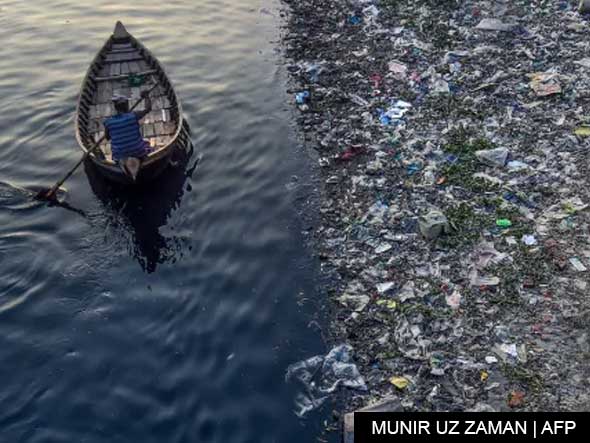More than 170 trillion plastic particles weighing roughly 2 million metric tons are afloat in the world’s oceans, according to new research, and that number could nearly triple by 2040 if no action is taken.
The authors of the peer-reviewed research paper, published Wednesday in the PLOS ONE journal, warn that “cleanup is futile,” if plastic continues to be produced at the current rate. They blame the plastic industry for rejecting commitments on buying recycled material or designing for recyclability.
To tackle the plastic problem, the researchers call on lawmakers to urgently enact policy measures that focus on source reduction and reuse, in order to minimize ecological, social and economic harm.
“The exponential increase in microplastics across the world’s oceans is a stark warning that we must act now at a global scale, stop focusing on cleanup and recycling, and usher in an age of corporate responsibility for the entire life of the things they make,” said Marcus Eriksen, co-founder of The 5 Gyres Institute, a U.S. group that campaigns to tackle plastic pollution.
The researchers assessed trends of ocean plastic from 1979 through to 2019 and noted a dramatic increase in the mass and abundance of ocean plastic since 2005.
They say this may reflect an exponential uptick in plastic production, fragmentation of existing plastic pollution or changes to terrestrial waste generation and management.
“Cleanup is futile if we continue to produce plastic at the current rate, and we have heard about recycling for too long while the plastic industry simultaneously rejects any commitments to buy recycled material or design for recyclability,” Eriksen said.
“It’s time to address the plastic problem at the source,” he added.
The rate of plastic entering the world’s oceans, without immediate action to reverse the current trend, was expected to increase roughly 2.6-fold from 2016 to 2040.
UN treaty
The research, which one scientist and plastics researcher told Reuters was “staggeringly phenomenal and almost beyond comprehension,” follows a historic global plastic pollution treaty that U.N. member states adopted last year.
U.N. member states are scheduled to meet this spring with the aim of developing a legally binding instrument on plastic pollution.
The authors of the research say it is critically important to establish a resolution that addresses the full cycle of plastic, from extraction and manufacturing to the end of life.
“The increasing accumulation of plastic particles in our environments and bodies will eventually lead to the inability for the planet to sustain life as we know it,” Scott Coffin, research scientist at the California State Water Resources Control Board, said in a statement.
“Now is the time for governments worldwide to unite in their efforts to reduce plastic production and further prevent its escape into the environment,” Coffin said.

